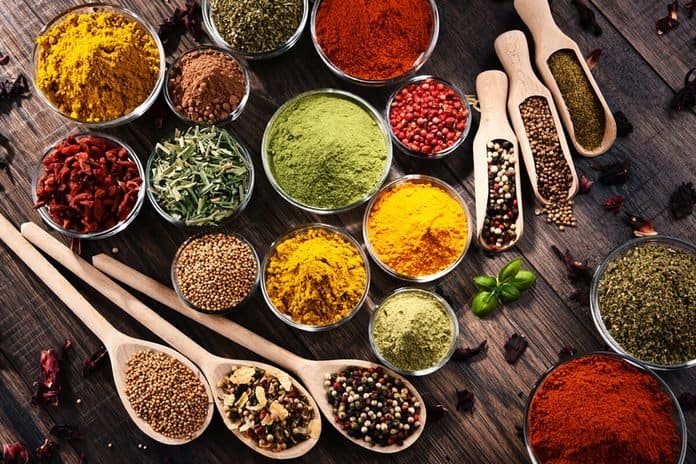Herbs And Spices Promote Better Heart Health
Nikki Attkisson | Last Updated : June 14, 2021Herbs and spices give more to meals than simply taste. They may also be beneficial to people’s health.
According to Kayla Kirschner, RDN, a nutritionist at Lenox Hill Hospital in New York City, studies have shown that adding herbs and spices in the diet has beneficial health effects, including anti-inflammatory effects.
Herbs And Spices Promote Better Heart Health
She went on to say that chronic inflammation is linked to heart disease, diabetes, cancer, and other diseases.
Scientists from Penn State University and Clemson University are set to discuss data from two studies that indicated the advantages of herb and spice consumption for cardiovascular health at the “NUTRITION 2021” Online meeting of the American Society for Nutrition.

According to one research, including herbs and spices in meals may help lower blood pressure in those at risk of heart disease. The other research found that spice supplements helped persons with type 2 diabetes decrease their cholesterol levels.
This study will help them examine dose, use, and short-term consequences, according to Kirschner, who was not part of the current study. Future research, hopefully, will give proof of long-term consequences.
Kristina Petersen, Ph.D., APD, is one of the speakers slated for this week’s ASN convention. She works as an assistant research professor at the Cardiometabolic Nutrition Research Lab at Penn State University Park’s College of Health and Human Development.
Petersen will discuss data from recent research conducted at Penn State and Texas Tech University that looked at the cardiometabolic impact of adding herbs and spices to the standard American diet.
According to Petersen, the findings imply that adding dry herbs and spices from the spice aisle of the local supermarket to routinely prepared foods has a favorable influence on blood pressure, a key risk factor for heart disease.
The study recruited 71 people from the United States who were obese and had other risk factors for heart disease. During the trial, individuals ate a normal American diet, with 50% of calories coming from carbs, 17% from protein, and 33% from fat, including 11% from saturated fat.
Every four weeks, the participants switched to a new variation of the diet: a low spice variant with 0.5 grams of mixed herbs and spices each day, a medium spice version with 3.3 grams of assorted herbs and spices each day, a spicy version with 6.6 grams of mixed herbs and spices each day.
The researchers discovered that people with a high spice diet had lower 24-hour blood pressure values. They discovered no change in blood cholesterol or blood sugar levels.
This is likely because the herbs and spices were added to a diet comparable to what the average person in the United States consumes, which is not as nutritious as diets suggested for health and heart disease prevention, according to Petersen.
She noted that eating a balanced diet rich in fruits, vegetables, whole grains, nuts, and legumes is still vital.
Another presentation at this week’s ASN meeting will go into the conclusions of a recent study review, which discovered a correlation between spice supplements and decreased cholesterol levels in persons with type 2 diabetes.
The study includes 28 randomized controlled studies in which persons with type 2 diabetes were given supplements containing ginger, cinnamon, turmeric, curcumin, or curcuminoid. Turmeric is the source of curcumin and curcuminoid.
The experiments lasted 1 to 3 months and revealed various results for different spices and supplement amounts. Supplementation had no meaningful effects in around 30% of the studies.
Dose-response studies investigate if and how changing doses of a supplement, drug, or other therapy affect the results.
Although more study is needed to understand the precise health impacts of herbs and spices, evidence suggests that using these nutrient-rich seasonings in daily meals may have some advantages.
Some herb and spice mixes include refined sugar or other additions.
Many herbs and spices are available as supplements in the form of capsules, extracts, tinctures, or teas.
Supplements allow people to consume a particular quantity of a herb or spice in proportions that are often greater than what is added to foods.
Although certain herbal and spice supplements may have health advantages, others may interfere with drugs or create additional negative effects. Certain supplements may not be suitable for everyone.
With over 15 years as a practicing journalist, Nikki Attkisson found herself at Powdersville Post now after working at several other publications. She is an award-winning journalist with an entrepreneurial spirit and worked as a journalist covering technology, innovation, environmental issues, politics, health etc. Nikki Attkisson has also worked on product development, content strategy, and editorial management for numerous media companies. She began her career at local news stations and worked as a reporter in national newspapers.
